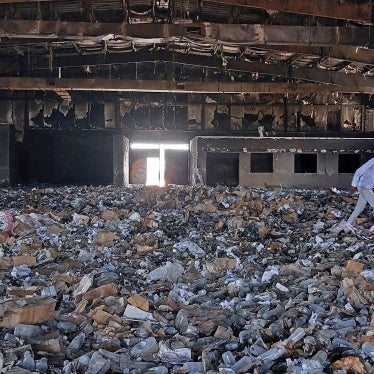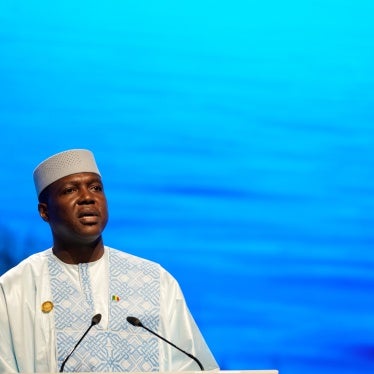(Nairobi) – Kenyan lawmakers should reject amendments to police laws that would expand the legal use of firearms and weaken civilian oversight over police abuses, Human Rights Watch said today. Parliament is expected to vote on the amendments before the end of September 2013.
The proposed amendments could exacerbate worrying patterns of police abuse and extrajudicial killings, and jeopardize long-awaited police reforms, Human Rights Watch said.
“Kenyan lawmakers shouldn’t be expanding police powers when there are such serious concerns about police abuses,” said Daniel Bekele, Africa director at Human Rights Watch. “Instead, parliament should focus on improving accountability for extrajudicial killings by police and on other, much-needed reforms.”
In May the attorney general proposed amendments to the National Police Service Act of 2011 and the National Police Service Commission Act of 2011. Among other changes, the amendments would expand the legal use of firearms to include protecting property and preventing someone charged with a serious crime from escaping lawful custody.
The current laws already allow for the use of lethal force by the police when their lives or the life of another person are in danger, but only when all other peaceful means are inadequate. Further amendments go against international standards. International law is directly incorporated into Kenyan law under the constitution.
Kenyan security forces should abide by the United Nations Basic Principles on the Use of Force and Firearms by Law Enforcement Officials, Human Rights Watch said. The principles call upon law enforcement officials to apply as much as possible nonviolent means before resorting to force and firearms, and to use intentional lethal force only when strictly unavoidable to protect life. The principles also require governments to ensure that arbitrary or abusive use of force and firearms by law enforcement officials is punished as a criminal offense.
In early August a member of parliament assaulted a female police officer in Nakuru, and villagers in Nyanza killed a military officer after they mistook him for a robber. Government authorities have publicly encouraged police officers to take advantage of provisions in the law allowing use of firearms to respond to these attacks.
On August 18, Kenya’s inspector general of police, David Kimaiyo, told his officers to “understand” their powers to use firearms, citing the assaults on the police officers. “I hereby direct police officers that when their lives are threatened they must clearly understand their powers to use firearms,” the inspector general said in a statement to the media.
On July 19, the cabinet secretary for interior and national coordination, Joseph Ole Lenku, openly directed the inspector general and other police commanders to use force, indicating there would be deaths if the warring Turkana and the Samburu communities in the Rift Valley failed to return voluntarily 50 guns that police lost in a botched operation there in December 2012.
In a televised speech in Samburu area of the Rift Valley, he said: “To the inspector general and other commanders, we shall give these communities two weeks. If they shall not have returned the guns, then we shall use force and people will die. Don’t come complaining to us when people die. You will know what government is.”
The Kenyan police have regularly been implicated in extrajudicial killings and other serious abuses prior to the 2007-2008 post-election violence. The Kenya National Commission on Human Rights (KNCHR) and the UN special rapporteur on extrajudicial, summary or arbitrary executions had documented police involvement in the targeted killing of up to 500 members of the Mungiki, a proscribed criminal gang that has been accused by the government of extortion and executions.
In a preliminary survey on extrajudicial killings released in mid-August, the human rights commission and the Independent Medico-Legal Unit (IMLU) found that, between May and August, police had shot dead 120 people in separate incidents under unclear circumstances. Police have not submitted reports to the Independent Police Oversight Authority to facilitate investigation in any of these cases. The Police Act provides that any killing by police must be reported to the oversight authority, a civilian body created in 2012 for investigation of incidents of police abuse.
Police have also recently used excessive force against protesters and in other circumstances in which lethal force may have been unwarranted. In May, police killed five people and injured 24 others in Kisumu when residents protested a court decision that confirmed Uhuru Kenyatta’s victory as president in the March 4 general elections.
On August 7, security officers in Moyale shot a human rights activist, Hassan Guyo. Guyo, 40, had travelled to Moyale from neighboring Wajir that day to assess the human rights situation following clashes between police and villagers protesting the firing of a chief. At a roadblock in Moyale, as Guyo was going about his work on a motorcycle taxi, he was ordered by a contingent of police and military officers to turn back. He was shot in the back as his motorcycle taxi turned and started back. Guyo had earlier complained to friends that a senior police officer in Moyale had threatened him with death.
Section 4 of the Sixth Schedule of the National Police Service Act of 2011 requires police officers who use lethal fire to report to their immediate superior, explaining the circumstances that necessitated the use of force, and for the police to prepare a report about the episode. Section 5 requires reporting any use of force that leads to death or serious injury to the Independent Police Oversight Authority for investigation.
The chairman of the Independent Police Oversight Authority, Macharia Njeru, acknowledged the problem of extrajudicial killings at a breakfast meeting with editors on August 21: “We know for a fact that there is a managerial problem within the police. There’s a total breakdown of accountability mechanism and it needs to be addressed fairly quickly.”
The need for police reform was identified as a priority well before the post-election violence, which then further exposed weaknesses in police operations. In September 2008 the Commission of Inquiry into Post-Election Violence recommended far-reaching police reforms after it found that police failures had contributed to the violence and the death of up to 1,100 people, and that police killed over 400 people under circumstances in which the deaths could have been avoided. In 2009 the National Task Force on Police Reforms recommended restructuring the force and vetting it to weed out officers implicated in human rights abuses, corruption, drug trafficking, and robberies.
Progress in carrying out the key institutional and legal reforms has been slow, however. The government established two important civilian oversight bodies – the National Police Service Commission (NPSC) and the Independent Police Oversight Authority, paving the way for Kenya’s first competitive hiring of an inspector general of police and two deputies by the commission.
But Kenya has not yet undertaken tangible measures to address accountability concerns within the police such as vetting police officers and restructuring the force to improve accountability and efficiency. As a result, human rights abuses by Kenyan police have continued and those responsible have not been held to account.
The Kofi Annan-led Panel of Imminent African Personalities, which brokered a peace deal that ended the 2007-2008 violence, has repeatedly attributed the delay in carrying out key police reforms to resistance by senior police officers and government political leaders. The inspector general of police told Human Rights Watch in early August that senior police officers are apprehensive because some proposed structural changes could abolish their jobs.
The proposed new police amendments remove some oversight powers from the National Police Service Commission and return them to the police inspector general, where in the past police had abused those powers. Some of the functions of the commission to be affected by these amendments include recruitment, vetting, and discipline of police officers, which had been subject of past abuses such as discrimination in promotion and recruitment that necessitated the creation of an independent commission in the first place.
The amendments also enhance the influence of the president and cabinet secretary for interior and national coordination over the police and the commission. They reinstate the president’s powers to hire and fire the police inspector general. Those changes would eliminate the inspector general’s security of tenure and effectively undermine the person’s operational independence, which is provided for in Kenya’s 2010 constitution.
Proposals to make the inspector general the chair of the National Police Service Commission as opposed to an independently hired civilian as provided for in the original act are inimical to the spirit of police reforms, Human Rights Watch said. This would effectively turn the commission into an internal accountability mechanism and seriously undermine its image as a civilian oversight authority as well as its capacity to act upon Police Oversight Authority recommendations for discipline against the police.
“Government authorities should be concentrating on accelerating the reforms that are essential to making the police accountable, not passing laws that would give them greater power to commit abuses,” Bekele said. “Authorities should bolster accountability in the force by proceeding quickly with other reforms on the agenda, such as vetting and restructuring the force.”







